
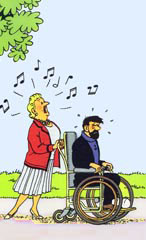
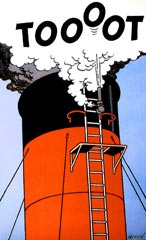
| Quiz | ||
| Open this image from The Red Sea Sharks and check your knowledge... | 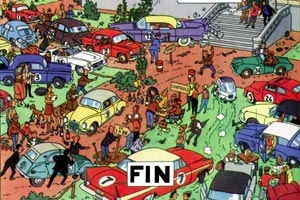 |
The two cars at the bottom right are not complete and hard to recognise. |
| How many do you know ? | ||
| The diva sings Gounod's Faust | |
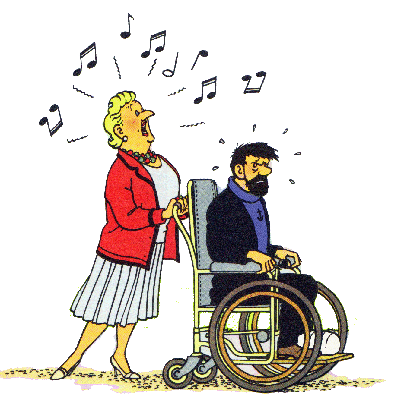
Bianca Castafiore singing the "Jewels" air |
|
| Eight cover pages | |
| Cover pages of Journal de Tintin in 1953, 1954, 1955, 1956, and 1979. Do you recognise the cars? If you know the second one, you are a real expert! |
|
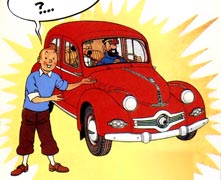 |
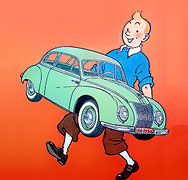 |
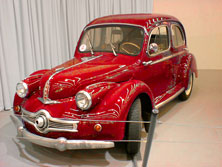 |
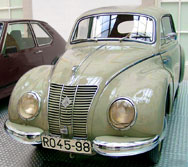 |
| 1953 | 1954 |
| The next ones are easier... | |
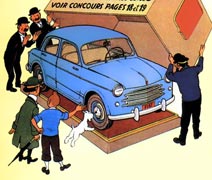 |
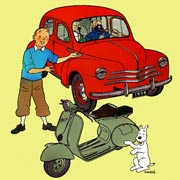 |
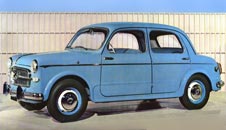 |
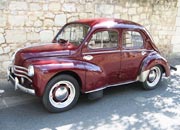 |
| 1955 | 1955 |
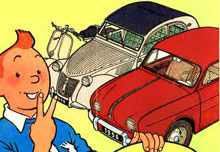 |
 |
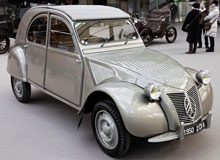 |
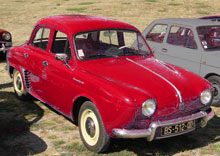 |
| 1956 | |
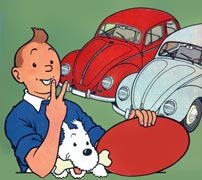 |
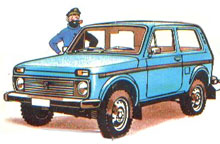 |
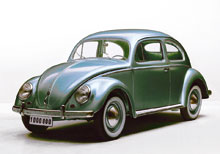 |
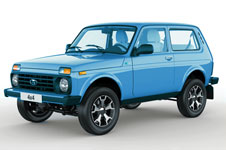 |
| 1956 | 1979 |
These cover pages are not advertisements; they show the prizes that can be won when entering competitions organised by "Le journal de Tintin". |
|
| Advertising for Citroën | |
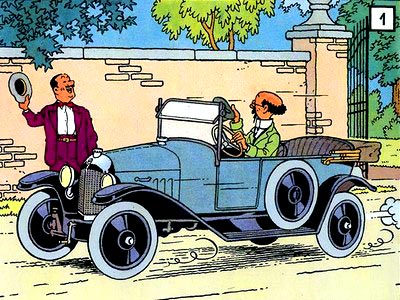 |
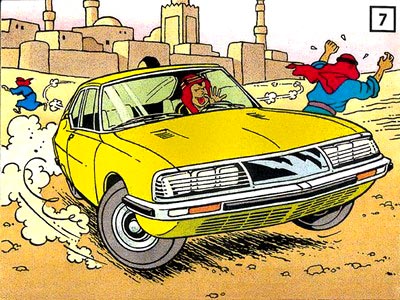 |
| 13 images by Hergé in another window, with two more ads for the 2 CV. | |
| A Bugatti from Quick & Flupke | |
| published in "Le Petit Vingtième" on 24 January 1935 | |
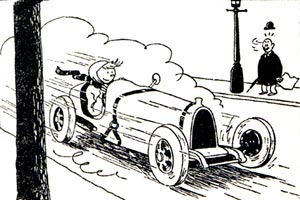 |
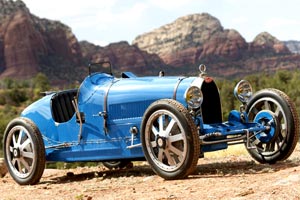 |
| Two American cars from "La Vallée des Cobras" | |
| (The adventures of Jo, Zette and Jocko) | |
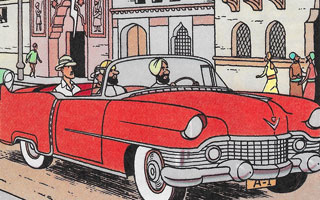
Cadillac 1954  |
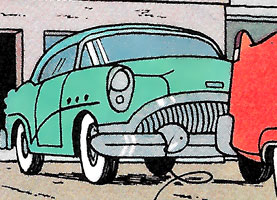
Buick 1954  |
| Variations | |
| Several of the albums have been "updated" by Hergé. One of them, The Black Island, has been thoroughly re-worked. See other examples on the next page. | |
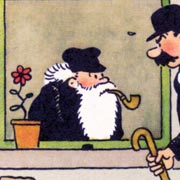 |
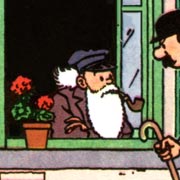 |
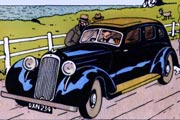 |
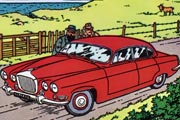 |
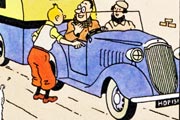 |
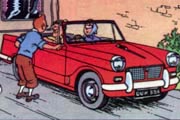 |
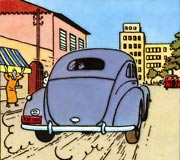 |
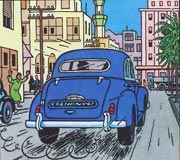 |
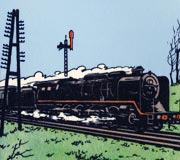 |
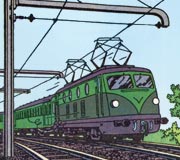 |
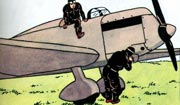 |
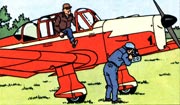 |
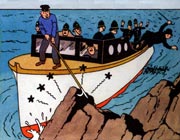 |
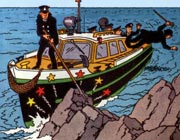 |
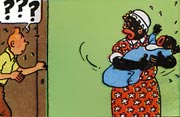 |
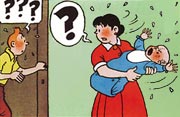 |
| A small mistake of the Hergé studios | |
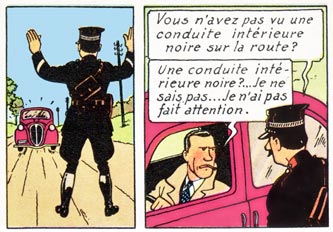 |
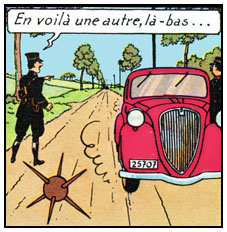 |
 The Seven Crystal Balls, page 46. The red car stopped by the Belgian road police is a Simca 8 "1100" or a Fiat from which the Simca was copied in France. It has a grille in two parts, and 4 doors that open in a characteristic way as shown in the second frame. The Seven Crystal Balls, page 46. The red car stopped by the Belgian road police is a Simca 8 "1100" or a Fiat from which the Simca was copied in France. It has a grille in two parts, and 4 doors that open in a characteristic way as shown in the second frame.
|
 In the following frame, the grille is in one piece, and the general shape of the car is that of a Simca 5 (Fiat Topolino) which was in production between 1936 and 1948. In the following frame, the grille is in one piece, and the general shape of the car is that of a Simca 5 (Fiat Topolino) which was in production between 1936 and 1948. |
| Another small mistake of the master | |
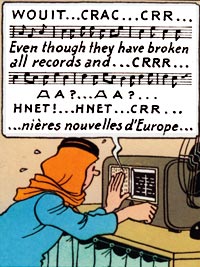 |
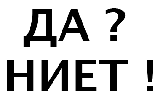 Page 42 of the Black Gold: Tintin is trying to get the news on the radio. He gets successively music, a broadcast in English, then in Russian, and finally in French. Whilst the "Da?" (yes in Russian) is correctly written in Cyrillic script, the "Niet!" is not: the Cyrillic "I" is an upside down Roman "N", and here it is shown the "Latin way". |
| A third small mistake | |
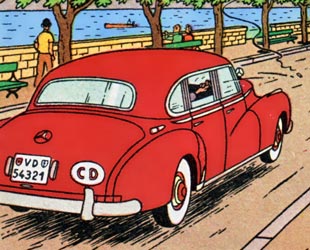
|
Page 28 of The Calculus Affair : The Mercedes 300 shows the CD of the diplomatic corps and is registered in canton Vaud (VD). This is not probable, as representatives of international organisations in Geneva woud have their cars registered in canton Geneva (GE).
Looking even closer, you will see that the emblem in the registration plate has a vertical division, which would correspond to Geneva, although the colours do not match: Other Swiss cantons also have diplomats: Berne, capital of Switzerland, and Zurich, where a few consulates are located. |
| Another quiz: the characters | |
| Do you recognise them? | |
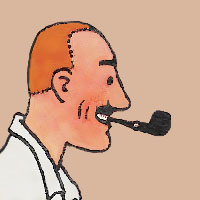
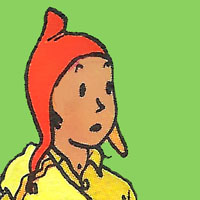
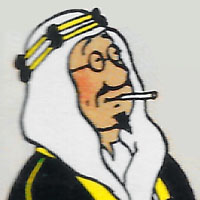
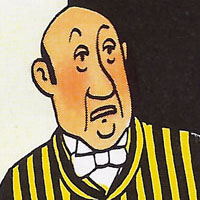
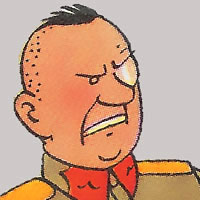
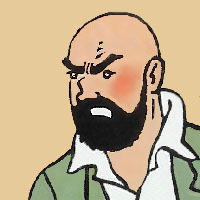
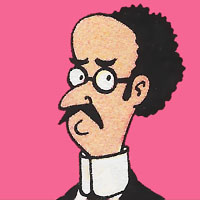
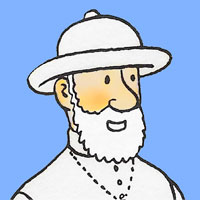
|
|
| If you want to see all the characters of Tibtin's albums, I have compiled a page containing more than 250 of them!
Tous les personnages principaux et secondaires sont répertoriés dans une page du site officiel de Tintin. On en trouve aussi une liste complète sur Wikipedia, mais sans images. |
|
| Was Hergé a racist? | |
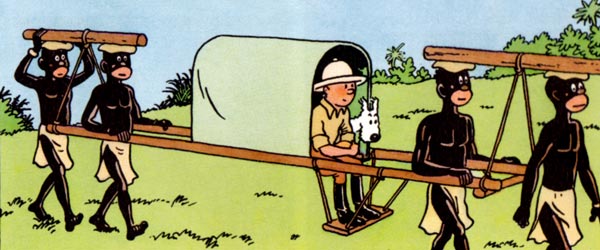 |
|
Tintin's albums, especially "Tintin in the Congo", were criticized for the way Blacks were treated there. Is that really racism?
|
|
| Marlinspike Hall | |
Marlinspike Hall (Château de Moulinsart) first appears in The Secret of the Unicorn. Here live the brothers Max and G. Bird, who kidnap Tintin and imprison him in the basement. The Bird brothers are later arrested (Red Rackham's Treasure) and the manor is offered for sale. It is acquired by Prof. Calculus on behalf of Captain Haddock. Hergé designed Marlinspike Hall based on the French castle of Cheverny. He removed both big external wings, but kept the central parts with most of their details. |
|
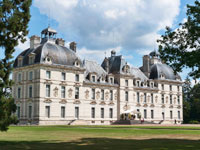 Cheverny |
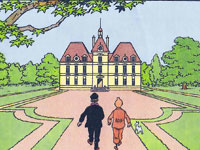 Hergé's Moulinsart |
There are small differences in the various representations of the manor: in the first image, the central staircase is curved, but straight in all subsequent pictures. The basement has the colour of the manor’s walls in the beginning, but later is made of grey stone, eithe uniform or in bricks. The basement window wells also do not appear in all the pictures. |
|
Initially, the entrance of the manor had a glass door. Later on, it got a monumental door with solid green panels. |
|
In The 7 Crystal Balls, the columns at the entrance gate are drawn in the same colour as the wall, whereas in The Red Sea Sharks, they are grey. |
|
| Where is Syldavia? | |
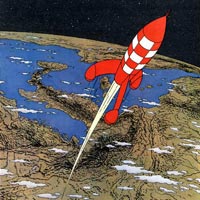
Hergé shows it precisely on a map. |
|
| Destination Moon: the Jeep of Prof. Calculus | ||
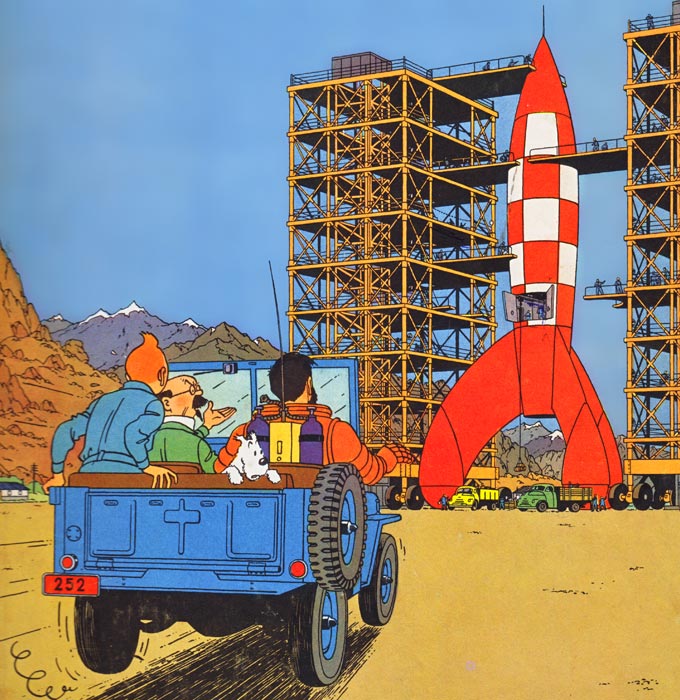 Destination Moon (album cover) |
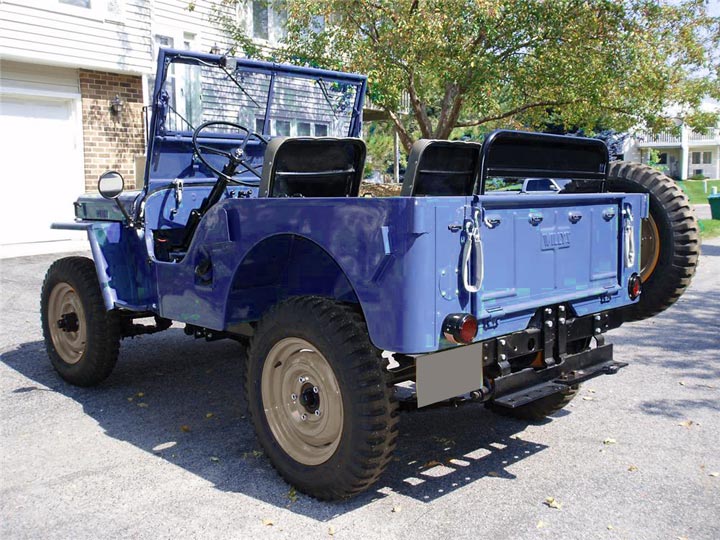 The actual Jeep Willys |
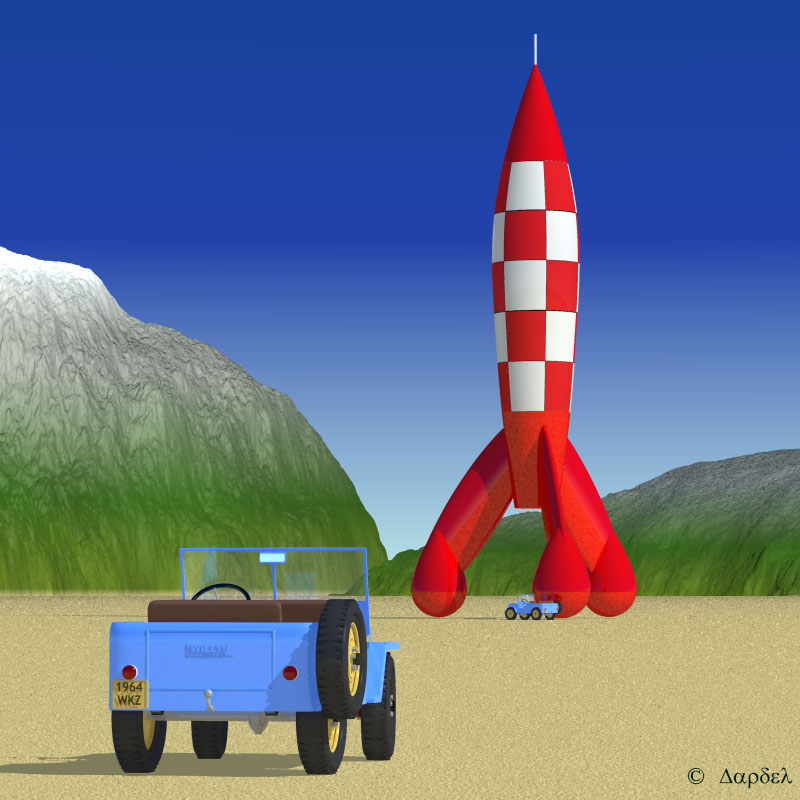 My version with POV |
| Learn Syldavian! | |
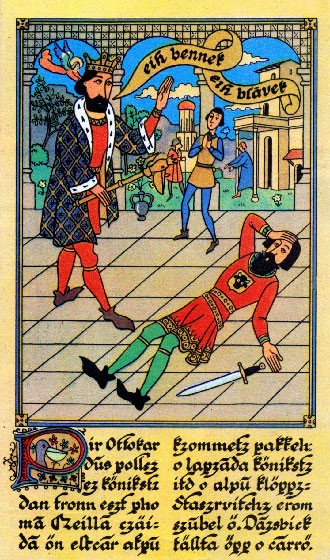
| Coat of arms of the kingdom of Syldavia (click) See last page of "King Ottokar's Sceptre".
The motto of Syldavian kings is: "Eih bennek, eih blahvet", in English: "Here I am, here I stay." If you want to know what the two farmers above are saying, see an exhaustive study of the Syldavian language. |
| From a different hand | ||
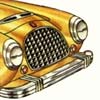 |
I prepared another page for you with 14 cars of the 1950's drawn by Jacques Martin. |
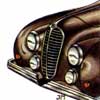 |
| as well as... | ||
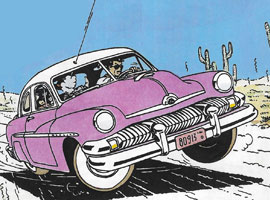 |
American cars by Ted Benoit. |
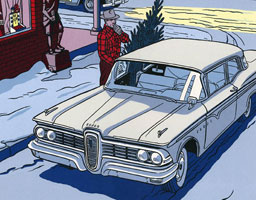 |
| See also my links on Tintin and on classic cars. | ||
| All pictures are obviously © Hergé, but this page was prepared by François de Dardel. Last update 28rd Jan 2022. | ||